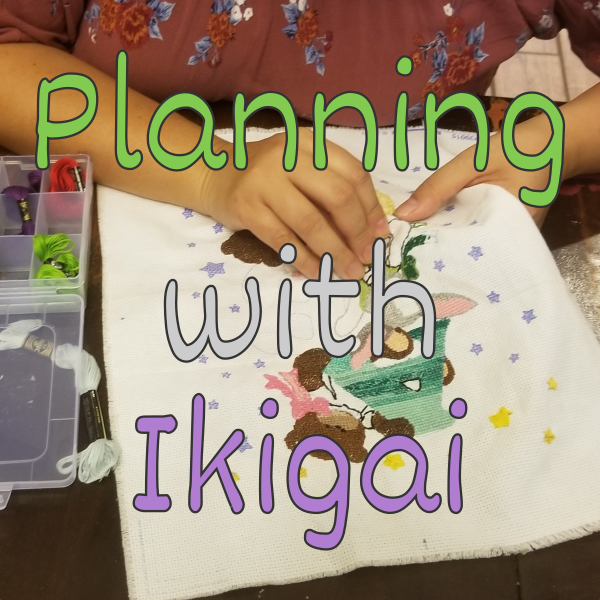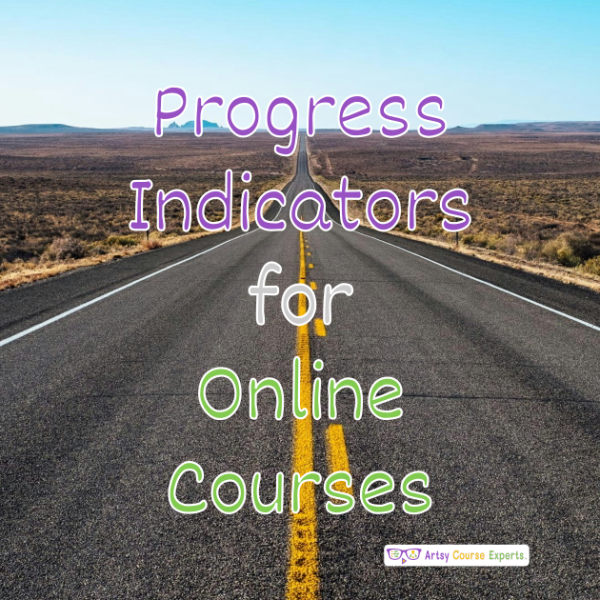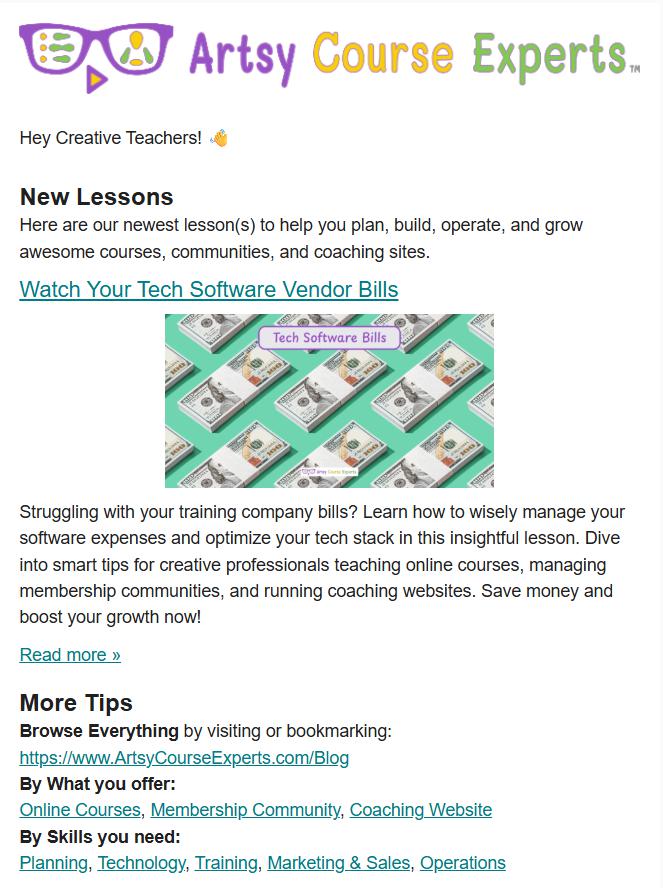What is Ikigai?
Ikigai (ee-key-guy) is a Japanese concept that combines ‘iki,’ which means alive, and ‘gai,’ meaning benefit or worth. Put together, it means something that makes one’s life worthwhile or simply a reason for living.
This philosophy guides the way Japanese people live. It is widely believed that this is the reason for their longevity and happiness. Hence a lot of people have adopted it as a means of discovering a meaningful career and achieving work-life balance. So, in this lesson, we’ll go over planning a course business with Ikigai.
Here are some potential problems if you don’t consider Ikigai when planning your course business:
- You could have a hobby that you can teach as a skill, but you won’t be able to use it to solve problems and help people.
- You may have a skill that you’re good at and can teach, but it’s cover expenses and you’re not growing
- You may have a profession that keeps you comfortable but leaves you feeling empty
- Without Ikigai, you may have what people want and get them to even pay for it, but you’ll be left with a feeling of uncertainty
- You may not be able to find a nexus between your passion and your purpose
Video Lesson – Doing what you love and benefiting from it
The Four Concepts of Ikigai
Ikigai has four main concepts, so we’ll look at each one and how to combine these concepts to find a course business that you’re good at, as well as something that people want and are willing to pay to learn.
So, let’s go over the four key areas of Ikigai:
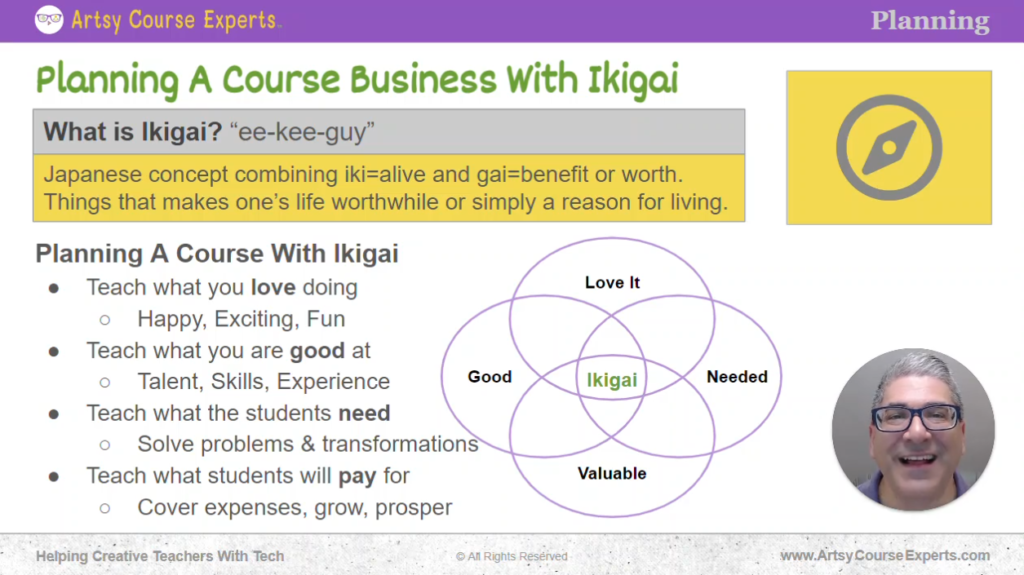
Teach What You Love Doing
Teach something that genuinely makes you happy, something that is exciting and fun. Something you can do all day long and you find so pleasurable.
It could be something like crafting, drawing, designing, writing, or playing music. It’s like a hobby you’re emotionally connected to and can’t seem to get enough of.
Teach What You’re Good At
The things you’re good at are your natural talents, your skills, your experience, and skills you’ve done for years and years. These are things you can do hundreds of times with your eyes closed.
You’re skilled in the art of doing this thing, and the parts of this skill come to you so easily because you’ve put in so many reps (repetitions). So aim to teach something that you’re really good at doing. Remember that if you’re not good at it, then it will be painful for you to do, and that doesn’t help with your Ikigai.
Teach What the Students Need
Thirdly, teach something that your students need. This is a skill that students are looking for or something in high demand among your students or prospective students.
These students want to become something, learn how to do something, and reach a certain level. So, helping students with what they need is important. Teaching something that nobody wants will leave you frustrated because of the lack of demand for your services such as courses, templates, coaching, and community.
Teach What Students Will Pay For
The fourth area of Ikigai is getting paid to teach what students will actually pay to learn. It’s not just that they are interested in what you teach, but that they really need it.
As a teacher and expert, you help students with important and painful problems. Students are willing to pay for someone to help them achieve a result and to remove problems in their life.
Since you are getting paid (hopefully well), that amplifies your happiness by making sure you can cover your life and work expenses as well as having money to buy fun things and experiences.
At this point, money shouldn’t be an issue because you’re doing things that you love and are good at, and people want it. Your students need it, and you feel joy in helping them, and consequently, you’re getting paid. And because you are happy, serving others, and getting paid – you can do it all day or life long.
The Right Ikigai Goals for your Teaching Life and Work
Now you know the four fundamentals that you should be thinking about when you’re planning your course business.
There are four goals: What you love, what you’re good at, what students need, and what students pay for.
Next, you should think about how you are currently or in the future going to combine 2, 3, or all 4 of these principles.
- If you combine what you’re good at with what you love, you end up with a passion.
- If you combine what you’re good at with what can get you paid, you end up with a profession.
- If you combine what students need, you end up with a mission.
- If you combine what students need with what they will pay for, you will end up with a vocation.
See the diagram for more details.
As you can see sometimes solving only 2 or 3 Ikigai areas, can leave you unfulfilled in satisfaction, pay, joy, and purpose. Often, it leaves you with an unpaid hobby or a boring job.
To achieve a happy, profitable, and rewarding life, you must find a nexus that solves three or four Ikigai goals.
It may take years of hard work, self-discovery, experiments, and small changes to get there. But over time, using an Ikigai compass can help you achieve happiness in all areas of your life.
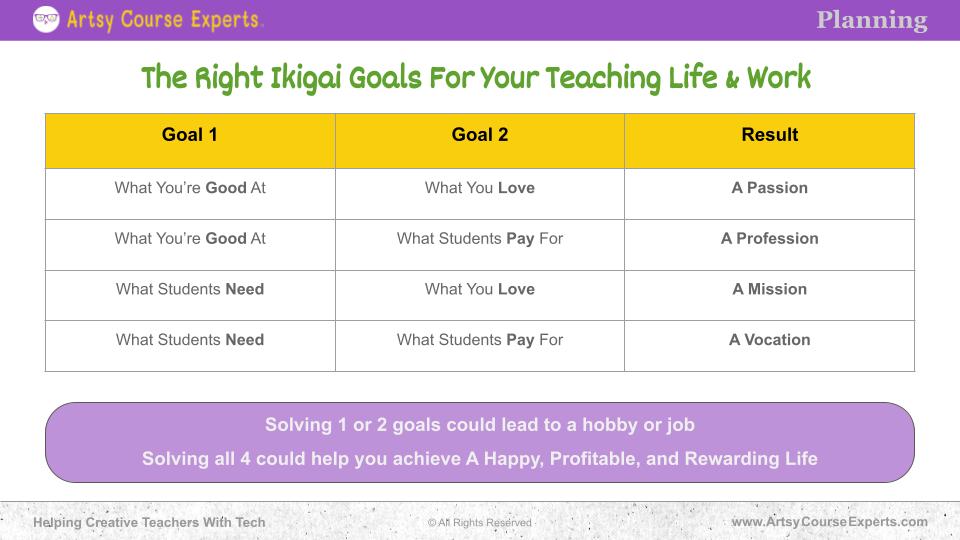
Frequently Asked Questions on Planning a course business with Ikigai

Summary – Planning a Course Business with Ikigai
These are some ways you can think about planning your course business, your courses, your resources, your community, your coaching, and of course how you want to spend your life years.
To analyze your Ikigai goals, go ahead and copy the overlapping four circles diagram or create a table with four boxes. Then start listing out your items in each of the areas. You can even score them with stars – like do you really love a thing or do you simply like it a certain pastime? You will notice that some of the areas are weaker than others, and that you need to make some changes to ultimately achieve Ikigai.
These final tips will help you with planning a course business with Ikigai:
- Think of what you love and something you’re always excited about doing
- Find the skill that comes to you easily, and you perform greatly without hassles
- Research how many people are looking for and interested in a topic
- Look at how much people are willing to pay to solve a problem or transformation
- Don’t get overwhelmed, just keep improving with small steps forward
- If you ever achieve Ikigai, set a reminder to re-evaluate every year or new venture
Hopefully, this course planning lesson has made you smarter in planning for your online courses, community, and teacher website.
For more creative teacher help building, operating, and growing your online courses, check out our ArtsyCourseExperts blog and subscribe to our email for regular tips.
More Tips For Online Teachers
These lessons can also help you with course planning, curriculum, operations, and sales:
- Finishing Your Online Course – When It’s Taking Too Long
- Planning New Online Courses Using SWOT Analysis
- Handling Student Buyer’s Remorse For Online Courses
- How To Outsource Online Course Work For Creative Teachers
- Using The ADDIE Model To Design Effective Online Courses
- Learning about Monthly Recurring Revenue for Online Course Creators
- Checking The Quality Of Your Online Course Lessons
- Handling Course Maintenance And Outages
- Glossary
- Creating Fast Content Structures With Bulleted Lists
Related Services For Teachers and Experts
We offer these services to help your course business with planning and happier execution:
- Online Course Coaching
- Validate Your Course Business
- Analyze Your Course Sales Page
- Analyze Your Online Course SEO
- Course Technology Maintenance
- Community Technology Maintenance
- Teacher Website Tech Maintenance

